Ruble's dramatic drop inflicts economic pain
The Russian ruble has lost nearly half its value as sanctions bite and oil revenue drops
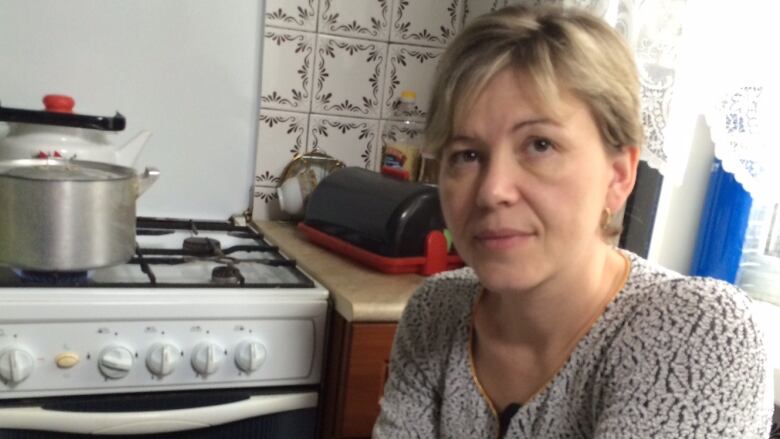
Svetlana Onike, a 36-year-old mother of three, lets out a long sigh,her shoulders droop, she's near tears.Sitting In her tiny one-bedroom apartmentan hour outside Moscow, Svetlana explains how her monthly mortgage costs have suddenly doubled to $2,100 USa month more than the entire monthly salary of most Russians.
"I'm so worried," she says. "To tell you the truth, I worry about it 24-7. When I'm up, when I'm asleep, there's only one thought goingthrough my mind:I hope they don't throw us out of here."
In 2008 she signed a mortgage on a $90,000 apartment. Even with her accounting jobthe banks wouldn't give her a traditional mortgage, but offered one in U.S. dollars instead. She took it.
- Russia's 'era of excess' ending with fallen ruble
- Russian ruble hits all time low of 55-to-1 versus U.S. dollar
- Russia will hit recession in 2015 because of oil and Ukraine
Hundreds of thousands of Russians did the same thing.
With a stable ruble and predictable payments, mortgages tied to the U.S. dollarseemed fine. Until this winter, when the Russian ruble fell off a cliff,losing nearly 50 per centof its value against the U.S. dollar.
Homeowners could only watch in horror.
If I would've had any idea about the risk, if someone would've warned me, I never would've taken out this mortgage.- SvetlanaOnike, mother of three
"If I would've had any idea about the risk, if someone would've warned me, I never would've taken out this mortgage,"Onike says angrily. "I never would have taken on millions of rubles of debt."
Russia has ableak history of ruble crises, but the past decade of prosperity has gone a long way to erasingthegrim memories. The currency seemed strong in recent years, oil was making Russia rich and the economy was growing.
That all changed over the last sixmonths. A near perfect storm of sinking oil prices, Russia's aggression in Ukraine, and western sanctions is now being worsened byrising inflation, up to 11.4 per centlast month.
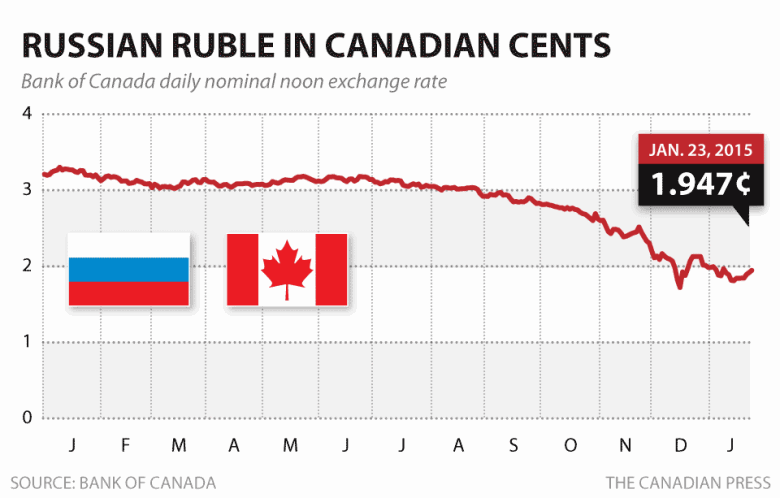
In comparison, Canada's inflation rate is at 1.5 per cent.
Russia's GDP is forecast to contract by 6.5 per centthis year, inflation to spike above 13 per cent,and it's estimated that another $135 billion could flee the country after record cash outflows last year. On Monday, ratings agency S&P cut Russia's sovereign credit rating to BB+, or below investment grade.
Food prices are spiking, and the selection is being affected, too.
At Azbuca Vkusa, an upmarket grocery chain in central Moscow, the shelves are stocked with products but many of the brands have changed.The store imports 60 per centof its grocery goods, and with the ruble cratering, costs are rising. That, coupled withRussia's ban on some U.S., European and Canadian food, is forcing substitutionssometimes from markets further away, such asSouth America orNewZealand.
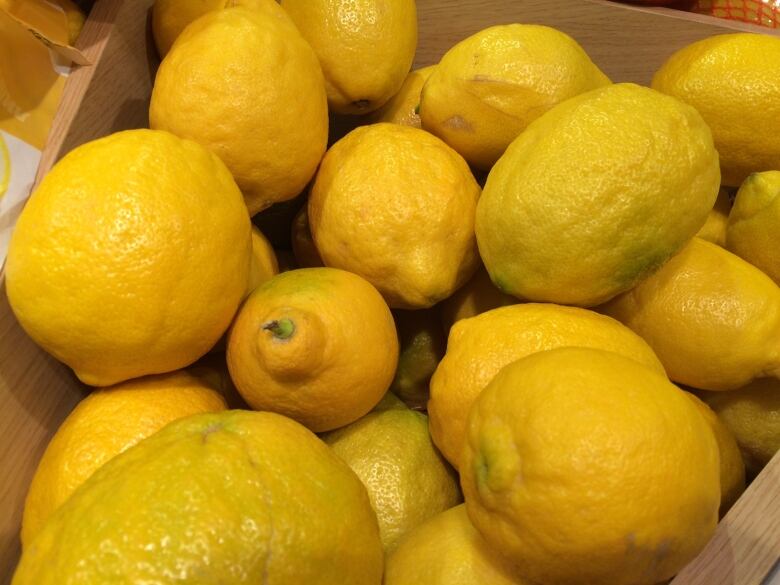
"The devaluation of the ruble makes otherimported goods very expensive, because we have tobuy them in euros and dollars,"says Andrei Golubkov head of the press office at the grocery retailer. "That hurts usand that hurts the customers, and the prices keeprising."
CBC News compared the cost of an average basket of groceries last summer with the same basketthis month, including staples like bread, milk, cheese, eggs, butter, sausage, and a bit of fruit. The cost jumped two and a half times.
"And it doesn't seem like that's the ceiling,"said one shopper.
On Moscow's glittering shopping streetsnear the Kremlin, the pinch of the ruble's rout isn't as obvious. Russians scurry into luxury stores advertising 50-per-cent-offsales. But underneath the veneer, the economy is contracting severely.
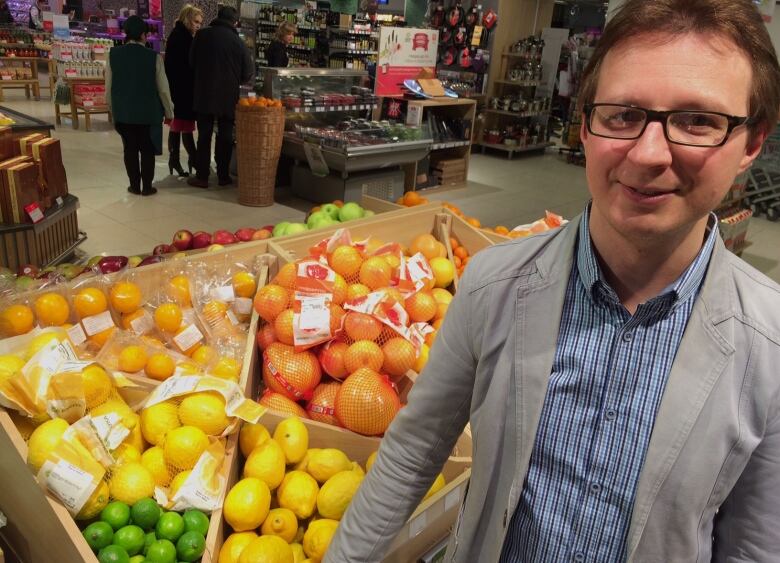
Russians like Svetlana Onike are among the first casualties.
She's joined a group of thousandsprotesting the skyrocketing mortgage costs, demanding banks recalculate payments based on thestronger ruble of even fourmonths ago. So far they're not winning.
"I have to cut back on everything,"she says, pausing as shestrugglesto contain her emotion. "I have to cut back.
My sister helps a bit. I don't buy much of anything. We eat less- Svetlana Onike
"My sister helps a bit. I don't buy much of anything. We eat less."
Vika,her 22-month-old daughter,is too young to understand, she says. But she tells her son Valery, 15, that, "this is all temporary. That he shouldn't worry, that sometimes things in life are hard, but eventually it will pass."
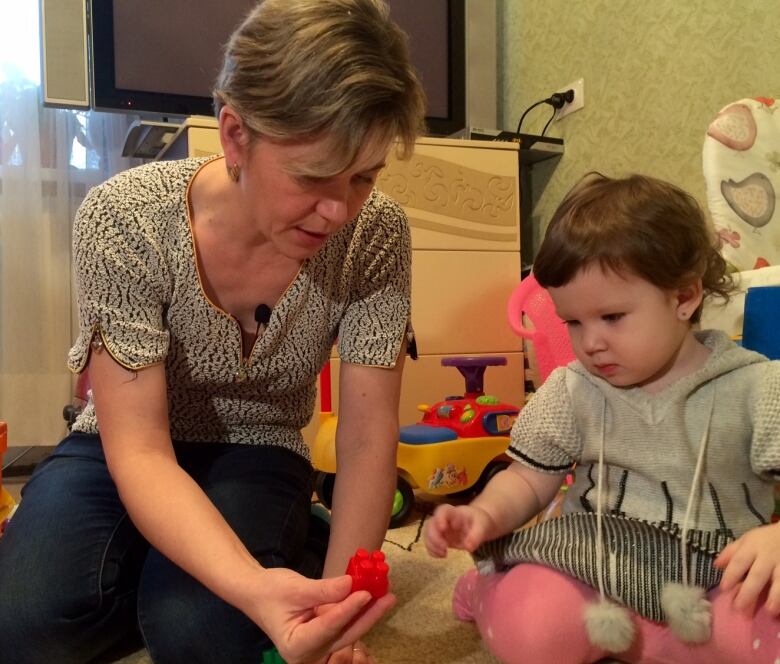
Onikeblames the banks for inflexibility even as the whole country grapples with a new economic reality. She says the western sanctions are hurting Russia, but doesn't connect them to her government's annexation of Crimea and the war ineastern Ukraine.
"I don't think our government is to blame for anything. I support my government completely,"she says.
Russia faces a grim economic picture in 2015, but still President Vladimir Putin seems somewhat insulated. That Teflon may begin to wear thin as the richest Russianslose billions. The country's 20 richest lost 62 billion US in 2014, according to theBloomberg Billionaires Index.
But it's ordinary Russians who feel the economic pain most acutely.
"I never thought in my life it could be so difficult," Onikesays.












_(720p).jpg)


 OFFICIAL HD MUSIC VIDEO.jpg)
.jpg)



























































































